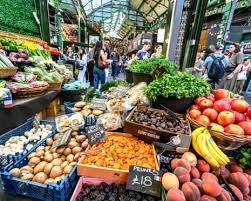UK inflation falls to 3.6% — But why are food prices still so high and what will the 2025 budget change?”

UK inflation falls to 3.6% — But why are food prices still so high and what will the 2025 budget change?”
After months of stubborn price pressures and a frustrating standstill in consumer confidence, the United Kingdom has finally recorded a modest shift in its inflation trajectory. October’s Consumer Prices Index (CPI) eased from 3.8% to 3.6%, signalling what many analysts hope is the beginning of a gradual return to economic stability. While modest, the drop marks the first decline in inflation since March and comes as welcome news to families, businesses and political leaders grappling with the lived realities of rising costs.
For much of the past year, inflation has behaved unpredictably. A temporary slowdown in 2024, which saw inflation fall as low as 1.7%, raised hopes that the worst was over. Instead, households were hit by a rebound in energy bills and a fresh wave of food price increases that caught many by surprise. Adding to the pressure were global shocks—including tariff-related disruptions linked to Donald Trump’s trade policies—and domestic cost burdens driven by the previous year’s tax adjustments.
Chancellor Rachel Reeves has hinted that the upcoming 2025 Budget will feature targeted measures aimed at sustaining the downward trend. One possibility under serious consideration is a reduction of the 5% VAT rate on energy bills—a move analysts believe could accelerate disinflation while providing immediate relief to consumers. Reeves recently voiced support for competition crackdowns in sectors like dentistry and veterinary services, where heavy consolidation has driven concerns about monopoly pricing.
Her task, however, is political as much as economic. Governments across the world that mishandled or underestimated the inflationary surge of 2022–2023 found themselves punished at the polls. Reeves is determined not to see persistent inflation added to Labour’s list of electoral vulnerabilities. According to Bank of England forecasts, inflation is expected to fall to its 2% target by 2027—yet the chancellor is pushing for faster progress, especially on interest rates.
Within the Bank’s Monetary Policy Committee (MPC), disagreements remain sharp. Some policymakers argue that interest rates must stay elevated to ensure inflation doesn’t rebound. Others believe conditions are ripe for gradual cuts, noting slack in the economy and rising unemployment. Governor Andrew Bailey recently cast a decisive vote to keep rates at 4%, aligning with the more hawkish camp.
But financial markets are betting that Bailey will shift stance. Investor expectations for a December rate cut surged to 82% immediately after the fresh inflation data was released. Yet another CPI reading is scheduled before the next MPC meeting, and some economists warn November’s inflation figure could edge back up. Wage growth also remains a sticking point, with Bank of England Chief Economist Huw Pill maintaining that high pay increases are still feeding into price pressures.
Meanwhile, food inflation has become the most painful stress point for households. Despite the headline CPI decline, food prices jumped 4.9% over the past year and remain 36.8% higher than four years ago. This stubborn rise in grocery costs is reshaping shopping habits, cutting disposable income, and dampening confidence—even as broader inflation cools. For many families, the relief in energy prices is overshadowed by the everyday reality of supermarket bills.
Looking ahead, the government’s decisions in the upcoming Budget may significantly influence how quickly the UK can exit this high-cost era. A meaningful reduction in energy levies, combined with a clearer path toward interest rate cuts, could help ease the financial strain on millions. But until the ongoing battle with food inflation is won, households are unlikely to feel any substantial improvement in their standard of living.
FAQ Section
1. Why did UK inflation fall in October?
Because energy prices rose more slowly than they did a year earlier, contributing to the overall decline in CPI.
2. Why are food prices still rising?
Supermarkets have been rebuilding profit margins after years of cost pressures, and supply chain disruptions continue affecting items like fish, cereals, and sugar.
3. Will the government reduce VAT on energy bills?
The chancellor is considering it, but a final announcement is expected in the 2025 Budget.
4. When will interest rates come down?
Markets expect a possible cut in December, but the Bank of England remains cautious due to wage and food price pressures.
5. Is the cost of living crisis ending?
Inflation is falling, but prices are still high—especially food costs—so many households will not feel immediate relief.

